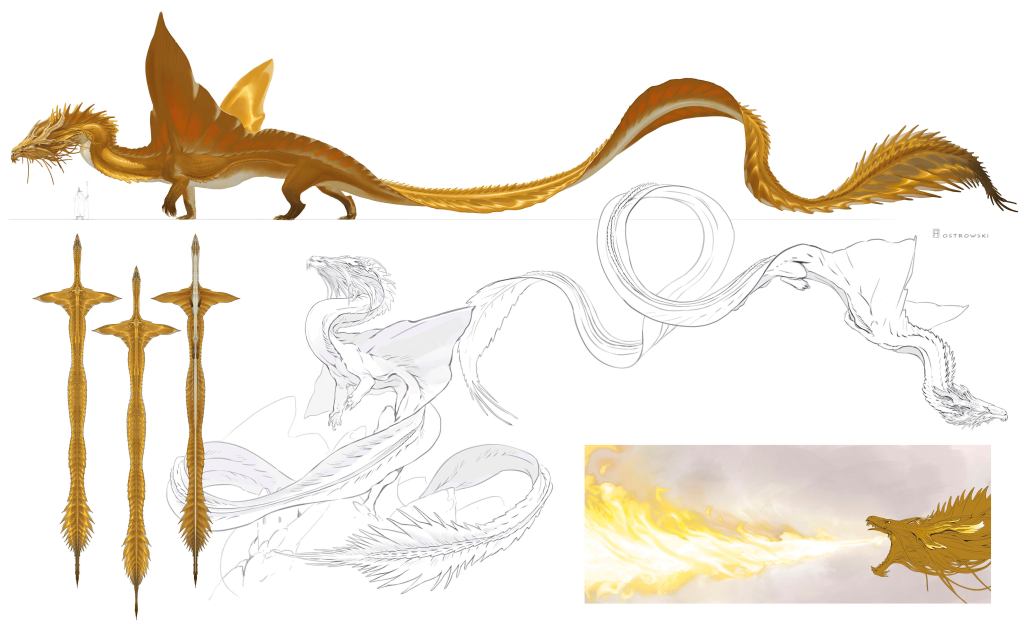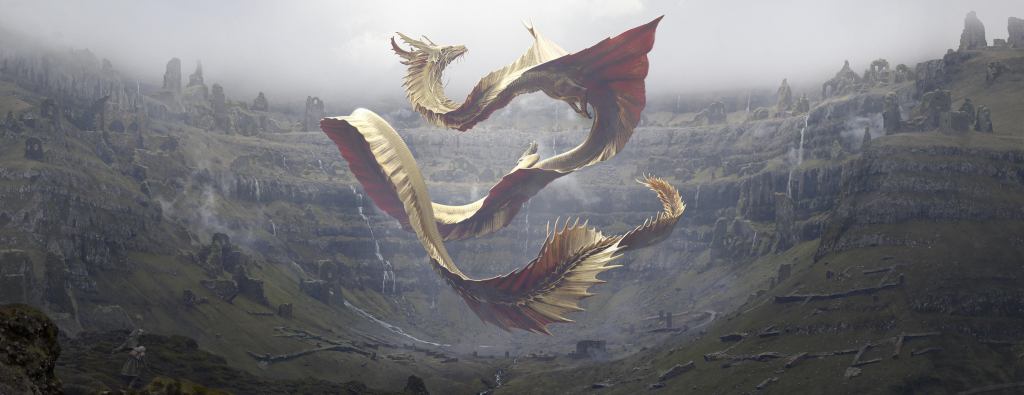Dungeons & Dragons is revamping all of its dragons in 2024, and that includes a stunning new rendition of the gold dragon. Last week, Dungeons & Dragons fans got a first look at the new gold dragon that will appear in the 2024 Core Rulebooks. The gold dragon appears on both versions of the 2024 Player’s Handbook cover and is very different-looking than the gold dragon as it has appeared in Dungeons & Dragons rulebooks since the early 2000s. Now, ComicBook.com can reveal the full concept art for the gold dragon by Alexander Ostrowski, as well as a new piece showing the serpentine version of the dragon in all its glory that was illustrated by Chase Stone.
Videos by ComicBook.com

ComicBook.com also had the chance to speak with Josh Herman, the head of art for Dungeons & Dragons, who explained why Wizards of the Coast opted to refresh the look for not only the gold dragon, but all the chromatic and metallic dragons that appear in the Monster Manual. “We wanted to refresh the dragons as a whole,” Herman explained. “There are several facets to it. The critique I would have on D&D dragons is they didn’t feel like they had unique identities in what their personality was or where they lived in their biome. They really spearheaded what a “modern-day” dragon looked like at that time. But since then, they hadn’t really been innovated on in a while, and so we kind of wanted to give them a push while we were doing this refresh. So, this is a good time to reinvent that and kind of look at them as a whole.”
Herman explained that they wanted to give the dragons more personality while respecting previous designs from D&D’s history. The Wizards team also wanted to differentiate how dragons in D&D differed from other fantasy settings. “A newer player or a newer fan might not understand that a D&D dragon can talk,” Herman said. “They’re intelligent, they can cast spells. They have motives. I think your classic fantasy dragon has been surpassed by the super powerful, aggressive, wyvern style dragon that we see a lot now [in other media.]”
Herman said that a lot of the redesigns leaned heavily on the stats and lore of the various dragons. For example, Herman noted that the gold dragon was the strongest of the dragons statistically, which inspired the gold dragon having a different look. “When you even read about the gold dragon as compared to the others, especially compared to the rest of the metallic dragons, they are different,” Herman said of the gold dragon lore. “They don’t interact with people as much. They like to be more isolated. They have a sort of almost a different code in the way that they think. And so to me, the gold dragon felt like something that should be it’s almost…be its own group in a way.”
In 1st and 2nd edition, the gold dragon had a serpentine form, but assumed a more “Welsh dragon” looking form starting in 3rd edition. The 2024 redesign blends together both designs, with a long, almost streamer-like tail and frills that eventually form wings near the front of its body. The decision to give the serpentine dragon wings was made to respect more recent designs and keep the gold dragon from feeling too different. “We didn’t want to just chop the wings off and all of a sudden it just feels like a totally different creature,” Herman said. “With the gold, what we wanted to do is actually shrink the main wings and play up the sort of ribbon-like appearance that they would have.”
Herman noted that the gold dragon as shown in the 2024 Core Rulebooks has different “modes” with the wings acting to help differentiate how the dragon might be moving. “It has sort of a gliding mode, it has sort of a flying mode. It has sort of a relaxed mode,” Herman said. “So, I could see [the wings] being a thing where it might not use them all the time, and maybe it is able to fly with them sort of tucked back a lot of the time when it’s going at a fast speed, almost like an F-14 Tomcat. The wings might come out to do different types of maneuvers at different times.”
Herman also said that the wing change was to help make it clear that as a magical dragon, it doesn’t really need wings to fly. “The wing change was really to give it a little bit of something extra, but also hopefully make it clear that they don’t need their wings to fly all the time,” Herman said. “That actually came from the stats…the Charisma modifier of an ancient gold dragon is like a 28. Which means this is probably one of the most magical creatures in D&D’s existence.” Another benefit to the wing change – the gold dragon’s outstretched silhouette resembles a sword, which was a deliberate design touch.

One strength of the upcoming 2024 Core Rulebooks is that Wizards of the Coast is filling the books with brand new art, and Herman said that Stone’s piece (shown above) of the gold dragon is one way that they are leaning into the lore of the game in intentional ways. “The piece that you have from Chase Stone is very much trying to capture the essence of a gold dragon,” Herman said. “It would be something that would live alone and almost in a way of it would be contemplating and thinking.”
Herman compared the gold dragon in Stone’s piece to Dr. Manhattan on Mars in Watchmen, an incredibly powerful being sitting alone and thinking about what the world is. That concept came straight from the 2014 Monster Manual, which notes that gold dragons live in the ruins of cites in fallen kingdoms. “There’s a melancholiness to that, which I think can be really beautiful and really does fit the vibe of what they are,” Herman said. “So that was very intentional. There is this sort of ruined area that it would be living in and what would that kind of be, and is this its home? How is it connected to that kind of place? So yeah, kind of the filling of space is very intentional there too.”
The goal of the new gold dragon, and other dragons that will be revealed in the future was to help expand the type of visuals and flavors that Dungeons & Dragons can provide. When asked if the dragons from The Legend of Zelda: Breath of the Wild played any inspiration in the look of the new gold dragon, Herman said that they were an inspiration along with the idea that dragons can play many roles in many kinds of stories. “D&D, especially for a while, has had that sort of the Welsh dragon style cornered,” Herman said. “We have that very well understood. So we wanted to bring in a couple of other flavors.” Herman pointed out that the bronze dragon has aquatic features in mind, while the (as of now unrevealed) green dragon is more serpentine in nature.
“We wanted to provide more options and let players choose which one fits their vibe for their game or whatever the one they like the most,” Herman said. “Whenever I design something, I prefer that people have a favorite. And right now, I wanted to give people in this design project more favorites that they might be attracted to. Whether it was the way it was expressed or the color or the shape or something. And if you don’t like one of them, that’s okay. I hope that you like one of the other ones a lot. That’s the intent of giving you a cast of characters that you can play with. So yeah, we’ve really loved it.”








